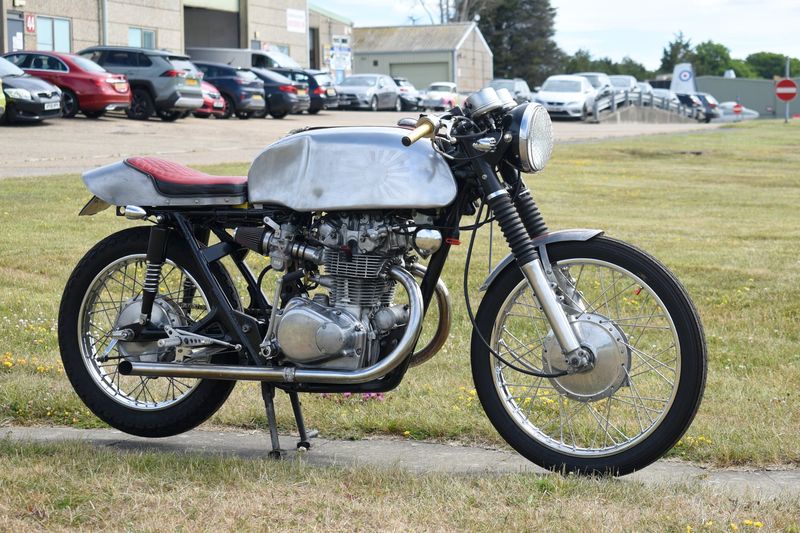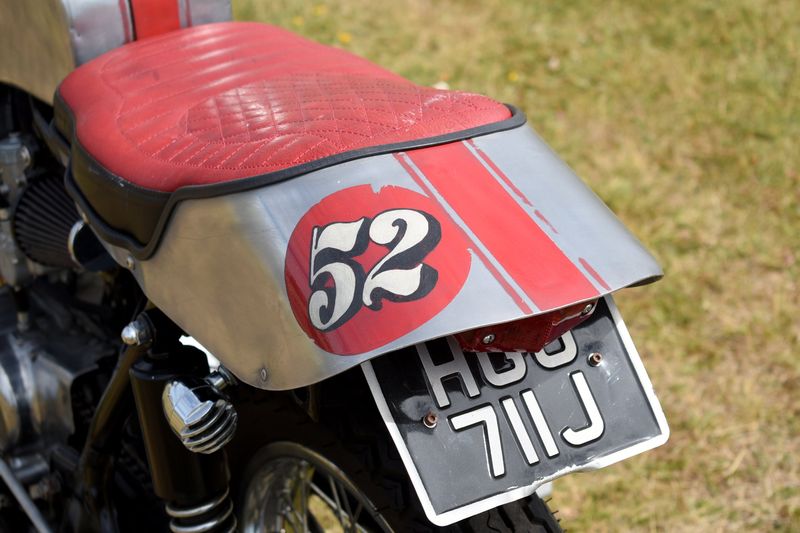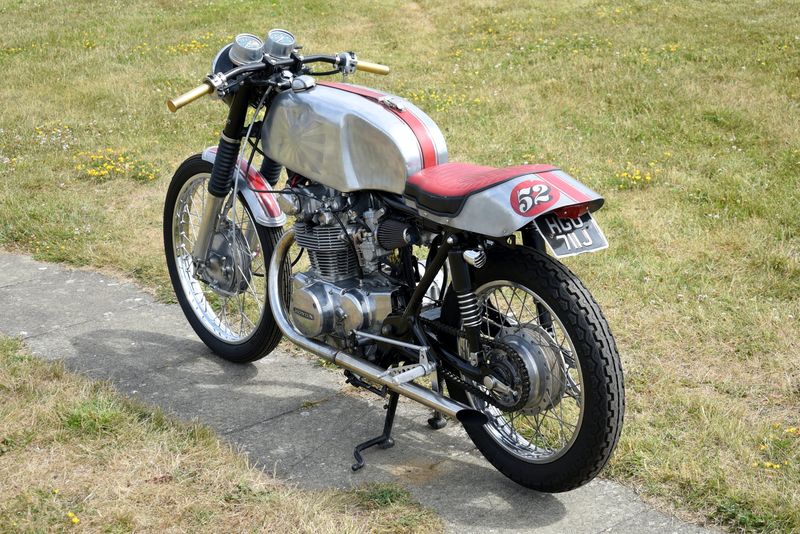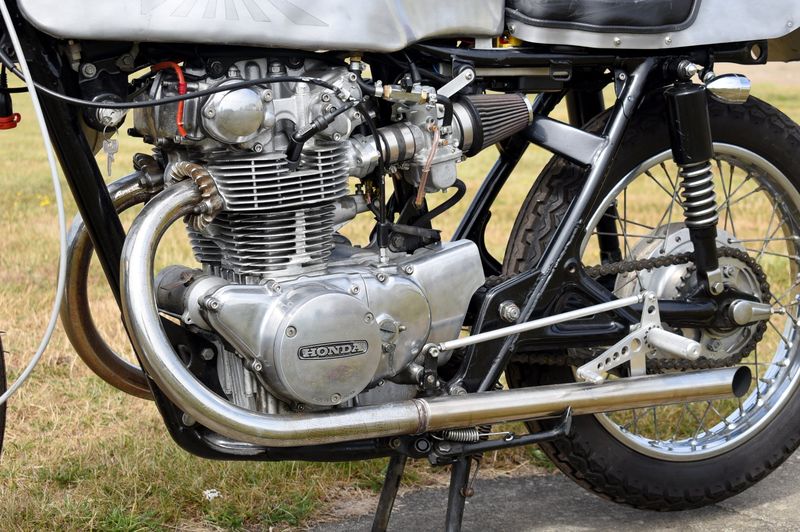Highlights
- Imported from the USA and UK-registered in 2017
- Built as a café racer by a London-based motorcycle enthusiast
- Starts easily and sounds magnificent
- Only 600 miles covered since 2017
The Appeal
Although British motorcycles were still the best motorcycles in many enthusiasts’ eyes in the 1960s, they were facing a new threat from the Orient.
Japanese manufacturers such as Honda, Yamaha and Kawasaki were seeking to make in-roads into the American and European markets, and they would eventually succeed, in part due to them being more reliable and better-engineered than their British counterparts of the time.
Japanese manufacturers such as Honda, Yamaha and Kawasaki were seeking to make in-roads into the American and European markets, and they would eventually succeed, in part due to them being more reliable and better-engineered than their British counterparts of the time.
Success wasn’t immediate, though. The CB450 of 1965 was Honda’s first attempt at a big motorcycle, but it made little impression on motorcyclists who had fallen in love with the Triumph and Norton 350s, 500s and 650s, and V-twin Harley-Davidsons.
Its poor overseas sales must be attributed in part to Japanese motorcycles being something of an unknown quantity in foreign markets but, equally, it lacked the styling to get pulses racing.
Its poor overseas sales must be attributed in part to Japanese motorcycles being something of an unknown quantity in foreign markets but, equally, it lacked the styling to get pulses racing.
Honda’s image improved with a styling update in 1968 and the introduction of the original superbike, the CB750, in 1969, but none of that is especially important where this CB450 is concerned; turned into a café racer by a London enthusiast, few bikes look as rugged, racy and exciting as it does.
From a distance it could easily be mistaken for a Triton or any more traditional British-based café racer, but the engine gives it away.
The 45bhp, double overhead-cam 450 twin is far more sophisticated than anything being built in Britain or America at the time and, being lighter than a production CB450, it should easily reach and exceed its original claimed top speed of 110mph.
From a distance it could easily be mistaken for a Triton or any more traditional British-based café racer, but the engine gives it away.
The 45bhp, double overhead-cam 450 twin is far more sophisticated than anything being built in Britain or America at the time and, being lighter than a production CB450, it should easily reach and exceed its original claimed top speed of 110mph.
In short, this bike blends the best British café racer styling with the best Japanese engineering. What could possibly be better?
The History and Paperwork
- Imported into Britain from America
- Built as a café racer by a London motorcycle enthusiast and registered for the road in 2017
- After completion, the bike was used lightly around east London and exhibited at the Bike Shed before
- Paperwork includes the V5C, documents from the DVLA relating to its registration, an MoT certificate from 2017 and one invoice from Cooperized Dyno & Service Centre
The Condition
- All the right café racer styling cues – racing tank, clip-on handlebars, and more
- Fully bespoke racing seat
- Presented with a beautifully cultivated patina
You’ll find there are a number of newly-built café racers appearing on the market at any one time, but perhaps you’ve looked at them and, for some reason which you can’t quite put your finger on, haven’t felt moved to buy them? They just don’t quite have that look you’re after. Why ever not? We’d bet good money it’s because they’re too new and shiny.
This Honda isn’t suffering from that affliction. Although still a fairly new build and very little-used so far, it has just the right amount of patina, that all-important but often-neglected ingredient of the café racer look.
This Honda isn’t suffering from that affliction. Although still a fairly new build and very little-used so far, it has just the right amount of patina, that all-important but often-neglected ingredient of the café racer look.
While we don’t know the precise details of the build, we’d have a guess that an original 1960s or 1970s tank was used, hence it has just a few small knocks and light marks to suggest some age, but it is otherwise in very good condition.
On the other hand, the front mudguard and the racing seat are new, bespoke items, but ones which still give the impression of having been on the bike for years, because they blend in with the finish so well. Although new, their racy red stripes have been convincingly distressed, so they really look the part.
The seat itself gives the same impression. While it was upholstered to a bespoke design only a few years ago, the leather appears suitably aged and a few marks on the surface make it look better, we think.
While the æsthetic is that of an old and oily bike, the frame is in excellent order. It was most likely freshly powder-coated during the café racer build.
The wheels are also in wonderful condition, with just some light pitting on the rims to give them a look which is weathered but by no means scruffy.
The wheels are also in wonderful condition, with just some light pitting on the rims to give them a look which is weathered but by no means scruffy.
The Mechanics
- New carburettors and electronic ignition
- MoTed in 2017 with no advisories
- Engine runs very well, with a spectacular sound
While we’re on the subject of the CB450’s mechanicals, it’s worth saying a word or two just about its engine so we might appreciate just how advanced it was when new.
As we know, it’s a dohc engine, so it can be revved higher and produce more power than a sohc engine of the same size, and that was more or less unheard of at the time of its release.
While dohc motorcycle engines were by no means a new invention, they had never caught on in production motorcycles.
Consequently, Mike Hailwood’s CB450 was banned from competing in the 500cc class of the 1966 500-Mile Race at Brands Hatch because the FIM somewhat nonsensically declared it ‘could not be classified as a production machine as it had two overhead camshafts’.
As we know, it’s a dohc engine, so it can be revved higher and produce more power than a sohc engine of the same size, and that was more or less unheard of at the time of its release.
While dohc motorcycle engines were by no means a new invention, they had never caught on in production motorcycles.
Consequently, Mike Hailwood’s CB450 was banned from competing in the 500cc class of the 1966 500-Mile Race at Brands Hatch because the FIM somewhat nonsensically declared it ‘could not be classified as a production machine as it had two overhead camshafts’.
Mike Hailwood may have been disappointed, but anyone who went and bought a CB450 certainly was not. The engineering was in another league from British bikes, with reliable electrics and an electric starter all part of the bargain. At 51 years old, the café racer’s engine is as good as ever it was.
While we suspect it received plenty of mechanical attention before it came to Britain (the very low mileage would suggest a possible engine rebuild 15,000 miles ago), we do know that when it was built as a café racer it received new Mikuni carburettors and was fitted with electronic ignition.
The carburettors are non-standard and the vendor has advised that they may benefit from slight rejetting to give leaner running. Further use will be required before it can be determined if that is necessary, but it will be a very simple task either way.
The carburettors are non-standard and the vendor has advised that they may benefit from slight rejetting to give leaner running. Further use will be required before it can be determined if that is necessary, but it will be a very simple task either way.
As the bike is currently fitted with a small Motobatt battery, the electric starter is presently non-functional and the bike must be kick-started, but we are advised that the electric starter is in working order and only requires a larger battery to function as it should.
We have seen the bike fire up and run and were most impressed. It started willingly and sounded phenomenal – thunderously loud and full of energy. The exhaust pipes at present have no baffles in them, so it could be quietened a bit if desired.
The only significant deviation from standard is that the rebuilt front wheel has been fitted with an earlier TLS drum brake, as opposed to the disc which was standard by 1971. We would not be tempted to change it – it will still stop itself quite capably, and a drum is really necessary for pulling off the ’60s café racer look.
While the bike does not have a current MoT, it was tested shortly after its rebuild in 2017 and passed with no advisories.
Since it has only covered 600 miles since then and has been exercised recently, we do not envisage that any problems should arise.
Since it has only covered 600 miles since then and has been exercised recently, we do not envisage that any problems should arise.
Summary
The Honda CB450 was a magnificently advanced and well-built bike when it was new, but it lacked that mysterious special quality which enthusiasts covet.
Fortunately, thanks to its conversion into a café racer, this particular CB450 has found that special quality, and possesses it in abundance.
Fortunately, thanks to its conversion into a café racer, this particular CB450 has found that special quality, and possesses it in abundance.
Just to look at it, one senses its charisma, with its dynamic, stripped-down street racer æsthetic matched with just enough oily-rag patina to give it that well-used look.
Then you fire it up and hear it run, with the ear-splitting staccato that stirs the soul of every motorcycle enthusiast.
It’s all been assembled to a very high standard and mechanically it’s had very little use, but it looks so good that it really deserves to be seen and admired. It just needs someone like you to rev it up and ride it.
Then you fire it up and hear it run, with the ear-splitting staccato that stirs the soul of every motorcycle enthusiast.
It’s all been assembled to a very high standard and mechanically it’s had very little use, but it looks so good that it really deserves to be seen and admired. It just needs someone like you to rev it up and ride it.
Notice to bidders
Although every care is taken to ensure this listing is as factual and transparent as possible, all details within the listing are subject to the information provided to us by the seller. Car & Classic does not take responsibility for any information missing from the listing. Please ensure you are satisfied with the vehicle description and all information provided before placing a bid.
All bids are legally binding once placed. Any winning bidder who withdraws from a sale, is subject to our bidders fee charge. Please see our FAQs and T&C's for further information. Viewings of vehicles are encouraged, but entirely at the seller’s discretion.








